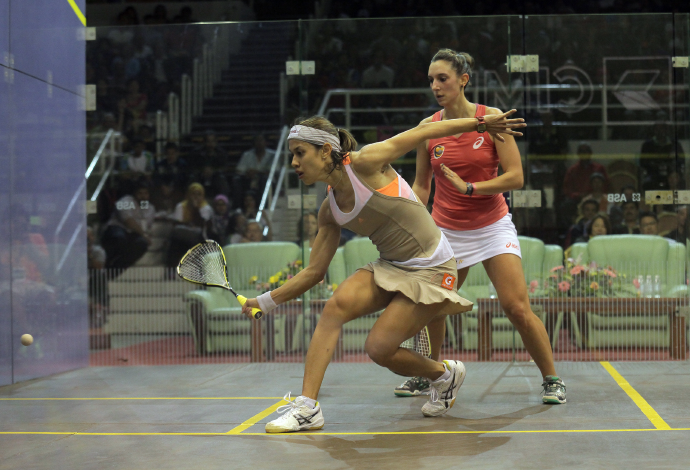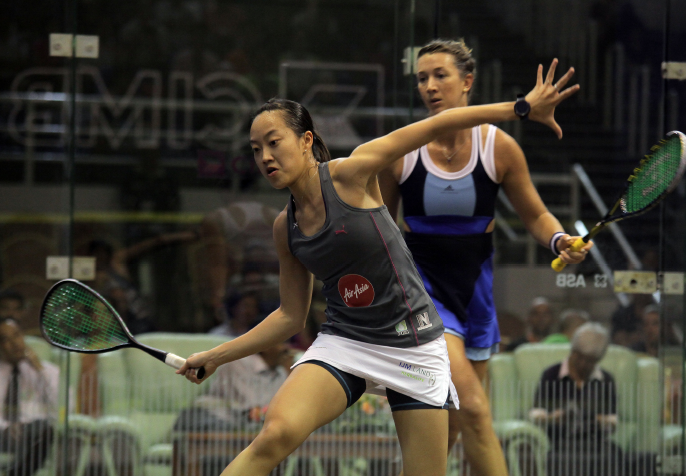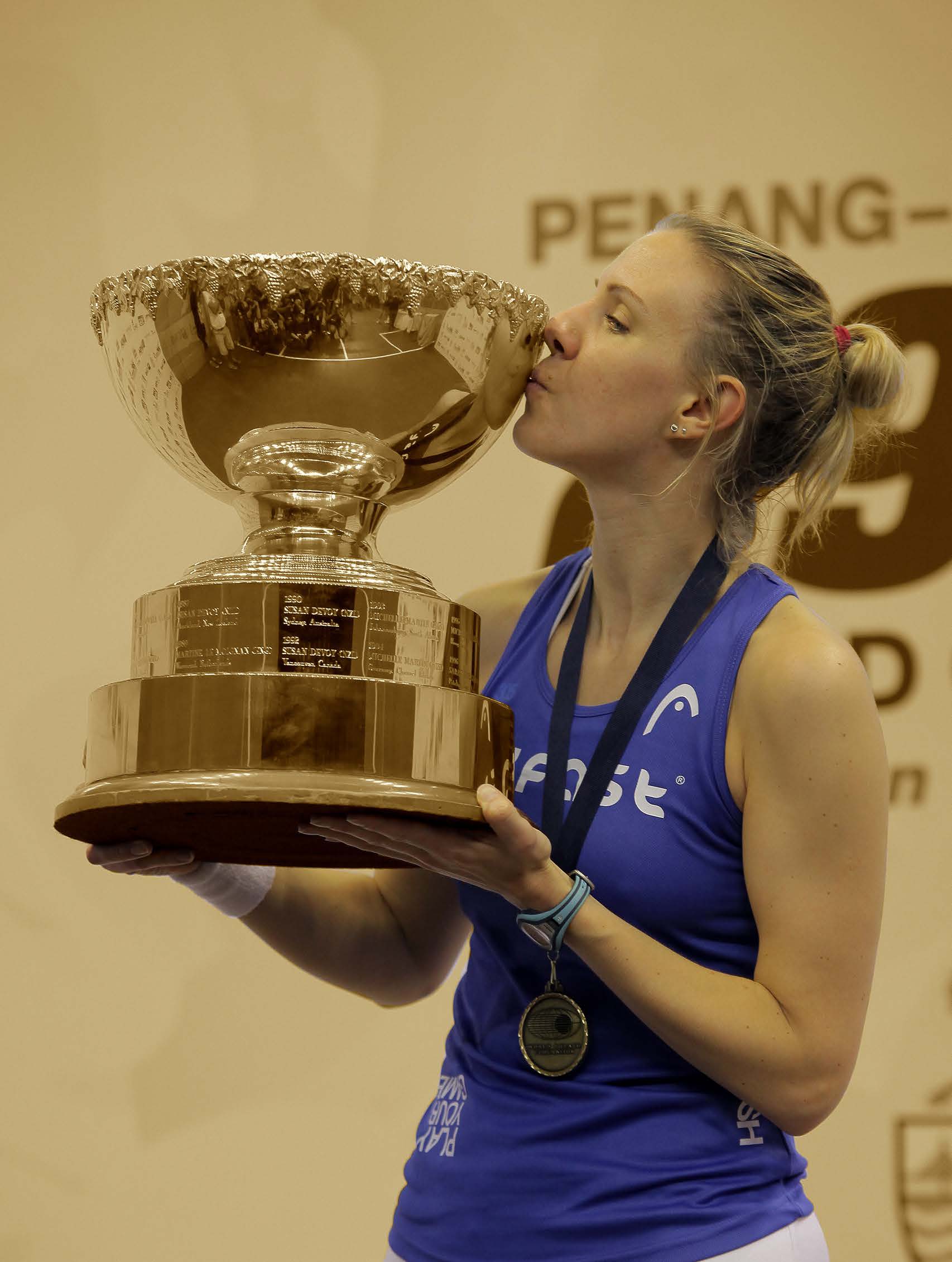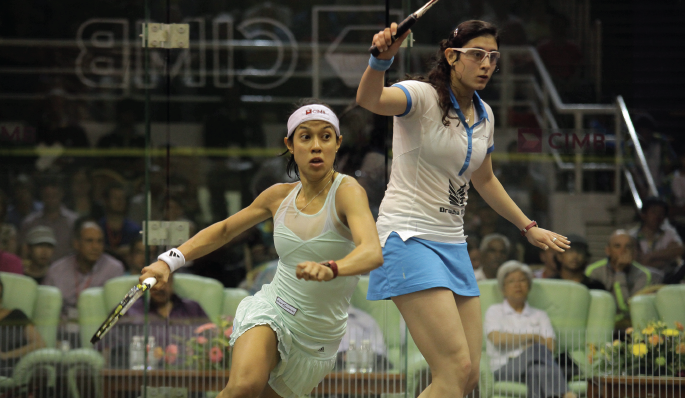By Richard Eaton
Photos Courtesy: Lynn Khoo

Is it the beginning of the end for the highest profile player of all time? The question had been regarded by many as unthinkable but it certainly entered a few people’s minds after the relentlessly feted Nicol David suffered one of the biggest shocks of all time.
World champion a record seven times, apparently the hottest of favorites to win an eighth, David lost the title in her home state of Penang in a tournament that had largely been designed to celebrate her uniquely legendary status.
The Malaysian has become a symbol of a post-colonial nation’s burgeoning success, with a clutch of top civic honors and a host of sporting ones. She is also an icon for women throughout much of Asia, and has even had a stadium named after her.
Hence her five-game loss to Nour El Sherbini in the semifinals of the world championships, affected more people more deeply than the defeat of any squash player since Jahangir Khan back in 1986.
It sent waves through the squash world and stunned the locals in disbelief, but the great paradox is that David’s demise was really not such a surprise at all.
The patriotic demand that she should always succeed and the pressure to live up to her celebrity has been greater for David than any other squash player— Jahangir included—and is one of the reasons why she based herself far away in Amsterdam.
She was required to deliver in a tournament created because, as Penang’s chief minister Lim Guan Eng said: “The government feels it will be a shame if Nicol is unable to add to her already impressive record of seven world titles”— and that, eventually, and quite forgivably, proved a little too much.
There is a precedent. When the 2006 men’s World Open was staged spectacularly in front of the Giza pyramids, principally so that the defending champion Amr Shabana could win the title again before an Egyptian audience desperately in need of good cheer, he suffered a similar defeat.
Half way through Shabana admitted that having such huge expectations placed upon him was a nerve-racking experience. “Why should it be?” came the TV presenter’s response. “You are among your people—everyone is on your side!”
That of course was his problem. It became David’s problem too.
Lest these psychological dramas detract from the achievements of the excellent Sherbini and the new world champion Laura Massaro, we should here pay tribute to both.
Sherbini, an eighteen-year-old Egyptian who is still formally a schoolgirl, hits with a force and a cleanliness that makes her the most dangerously gifted prospect in the game. If she stays clear of the injuries that caused her to slide from the world’s top twenty last year, she has the ability to be the thirty-year old David’s successor. (So perhaps has Amanda Sobhy, the United States number one).
Massaro is not far from achieving that now. She beat David in the final of the British Open a year ago—albeit in weird, open air, freezing cold conditions—and her tenacious inch-by-inch climb up the rankings to second place has been so gradual that few predicted it.
The English woman showed some of the stubbornness that brought this about as she edged her way back into the final against Sherbini and also when escaping from a remarkable quarterfinal against Low Wee Wern, the second best Malaysian, against whom she saved four match points. But Massaro too is thirty and has neither David’s experience nor her athleticism.
So, to answer to the question—the end may not be in sight for David just yet. She had won seven tournaments in a row until her hometown setback; squash is her life and likely to remain so.
Whether or not it gains a place in the 2020 Olympics in Tokyo—which by all accounts is still possible—David wants to compete, she says, for at least another five years. She has the compact physique to do so. How much longer she remains number one may depend on how well she continues to add volleying, short game skills, and tactical variations to her repertoire.
Like everyone else outside of Egypt, David was surprised by how well Sherbini had recovered from an injury enforced six months out of the game. On her comeback she had been beaten by Sobhy in Greenwich in January, and gained a mere thirteen points from David in Cleveland in February.
Now though, Sherbini was transformed. She dismissed three seeds— Kasey Brown, Joelle King, and Alison Waters—and struck the ball with impressive freedom. This was symptomatic of a mindset quite different from David’s, something which showed again in the final phases of a 4-11, 11- 9, 11-6, 2-11,11-9 semifinal victory that no one who saw it will forget.
The darling of the 4,000-person crowd looked en route to the final when she won the fourth game with something to spare. Even if she seemed unusually preoccupied, she looked in good enough shape and the momentum was with her.
Crucially, though, David could not craft an early lead in the decider, which meant that from about 5-5 onwards the tension began to mount. For David it created fear; for Sherbini the possibility of a dream. She surged to 9-6 and then 10-8, and then, in the last two dramatic rallies, the finest of margins decided it.
Sherbini put a drop shot into the tin on her first match point, but on the second landed another one more accurately. David reached it, but only just, which left her unable to clear the ball properly. There was a pause—brief but so crucial that it seemed to transcend the boundaries of time—before the fateful word “stroke” emerged from the referee’s mouth. A nation sighed.
“My focus was up and down,” David acknowledged. “Today everything worked out for her. Everybody plays their best squash with me,” she added, rare hints of self-pity intruding there. “Today Sherbini played her best squash.”

They may have been the most painful moments of her life. No one wanted to articulate those feelings with her. But the image of imploding emotions as she sat in her chair, and of her father appearing courtside to comfort her, said enough.
Massaro knew very well what David had had to go through. She was not surprised. “The Penang state pretty much put the World Open on for her to be able to win her eighth world title in her home town,” she said. “Four or five thousand people turned out for the opening ceremony. That stuff gets to you.
“There was always going to be a point when that pressure got very high, and it was just a question of whether she was going to be able to come through those moments.”
Now, however, the pressure was on Massaro, and like never before. She had hoped to get in under the radar. Instead David’s defeat put the gaze on her. She was the favorite now. She had never lost to Sherbini. The opportunity to take the world title was there.
“During the day I was a mess,” she said. “Before the match I actually thought I was going to be sick, which I’ve never had in my whole career. It was by far the most nerve-racking match and entire day of my whole life.”

Massaro won 11-7, 6-11, 11-9, 5-11, 11-9, but her mental state see-sawed in tandem with the scores. “At times I was super-focused, like I was all week, and at other times I was off with the fairies somewhere, worrying about what it would mean if I won,” she said, with a nice mixture of candor, humor and delight.
Once again everything hung on a tight final game. And once again, astonishingly, agonizingly, it ended with a penalty stroke.
Sherbini began the final game as she had finished the fourth, racing to a 4-0 lead and then to 6-2, driving with testing accuracy. Then she produced a mishit, and everything changed.
The next rally was the rally of the match. Massaro’s good length denied Sherbini attacking chances as the ball was worked to all four corners. There were a couple of great pick-ups from both women before at last an opening emerged—only for the young Egyptian to tin a backhand drop.
That changed everything. Massaro pushed on, extending a sequence of points to five, to lead 7-6, and soon she reached 10-8. Two match balls.
The first produced a long drawn out rally, which finished only when a Sherbini drive nicked the back wall. One saved. What a way to save it.
But her luck evaporated. On the second match ball, Sherbini was unable to keep playing the ball tight any longer and made an unintended block as she tried to recover. Once more came the decision of doom from the referee.
Massaro had won an enormous battle with herself as well as with an opponent who had been a revelation. “You’d get these thoughts slipping into your mind of ‘if I win I’ll be world champion forever’,” she said of the incessant struggle to keep her mind pinned down.
In those moments the mentality developed with her husband’s help may have been crucial. The transformation of Laura Lengthorn, as she was until she married in 2007, gained momentum with the psychological improvements nurtured by Danny Massaro, a lecturer in sports coaching and performance.
They were followed by shifts of technical and tactical emphasis, instigated in the last year or so by David Pearson, the coach whose analysis helped transform Nick Matthew into an unexpected world champion too.
Massaro may even have been helped by saving all those match points against Low Wee Wern two days previously. She had become battle hardened. “You look back and wonder if there are turning points—and that match was it,” Massaro said. “It was unbelievable. The home crowd were completely behind her. But I just felt relaxed.”
Afterwards she wouldn’t let the trophy out of her sight. Asked if they could take it away and engrave her name on it, she declined. Rather than be parted with it for any great length of time she took it with her on to the journey home to Lancashire.
But despite her tenacious heroics, this will be remembered as the week David could not meet with what others regarded as her destiny. Her ability to recover from this setback will depend on her attitude to it. Her words indicate she has already given this plenty of thought.
At one of the many functions at which she was called upon to appear, she detached herself from the idea that she was the sort of role model upon whose every result people had to hang.
“I would have never thought I could get to this point in my career…where everything falls into place. To have achieved what I have is really not something that is common,” she said.
“It should not be about finding a person to emulate what I have done, but to educate the public, and the bigger group—not just squash—to have the same kind of drive and purpose.”
This was clever. As well as suggesting to others how to make possible the best chance of succeeding, she was reminding herself to avoid suffering from expectations imposed by others.
“Losses will always happen,” she later said. “It is about how you manage it for the next time,” she said. “ At this level, there is little room to slip up and things will not go your way every time.
“The next phase is to sit down with Liz (Irving, her coach), to put something in place, and work on things I have to manage next time.”
That next time will be at the British Open in mid-May. Then the pressure will be on Massaro from the start. She became the first home woman in twenty- two years to win the British Open in Hull a year ago when she beat David in the final.
Now she is the first British woman ever to win both the World and British Open titles. Some people will expect her to win again. David will know how she is feeling.







